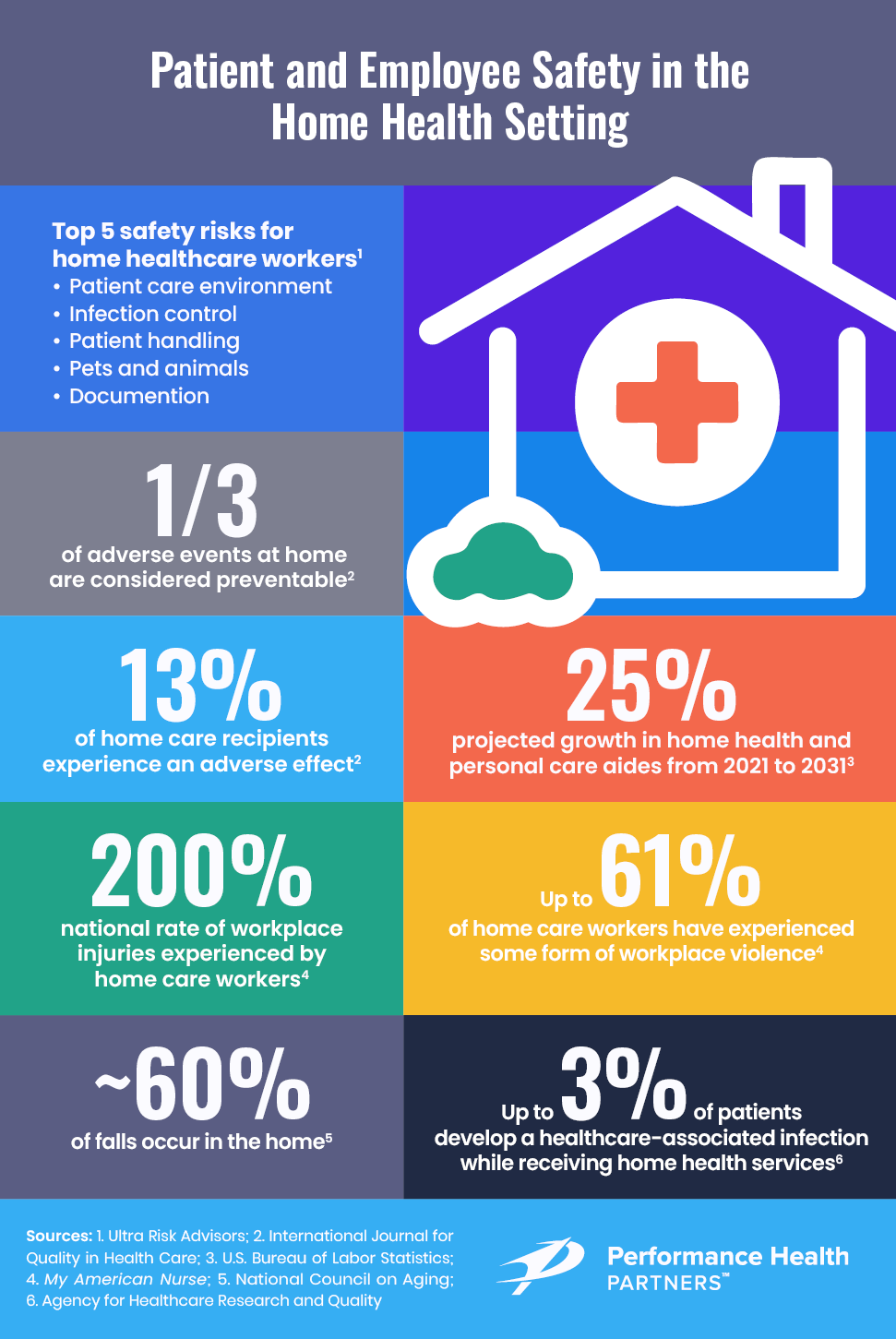3 min read
Why Incident Reporting is Important in the Home Health Setting
Performance Health Partners
May 15, 2023

Incident reporting is an essential process in the home health setting, as it provides an opportunity for healthcare providers to identify and address potential safety risks. The unique challenges and risks of the home health setting, such as the lack of constant supervision and the increased risk of falls, medication errors, pressure ulcers, and workplace violence, make incident reporting particularly important.
What Is Incident Reporting?
Incident reporting involves the documentation of any unplanned event or situation that has the potential to cause harm to patients, healthcare providers, or others involved in the healthcare process. These incidents can range from medication errors to falls, and it is crucial to report them promptly to ensure that appropriate action is taken to prevent similar incidents from occurring in the future.
In the home health setting, incident reporting is particularly important due to the unique challenges and risks involved. Unlike in a hospital or clinic setting, where patients are closely monitored and under constant supervision, patients in the home health setting are often alone or with minimal supervision. This can lead to a higher risk of falls, medication errors, pressure ulcers, and other safety issues.

By the Numbers: Patient Safety Events in Home Health Settings
Incident reporting helps to identify patient and employee safety risks and allows healthcare leadership to take appropriate action to address them. Risks specific to the home health setting are as follows:
Falls
Falls are the leading cause of injury among older adults, and approximately 60% of falls occur in the home. This highlights the significant risk of falls in the home health setting and the importance of incident reporting in identifying and addressing fall-related safety hazards.
Medication Errors
Medication errors are also common in the home health setting, with studies estimating that 50% of adult patients are affected by medication errors and almost 20% experience an adverse drug event post-hospital discharge. This underscores the importance of accurate medication management and the critical role of incident reporting in preventing medication-related adverse events.
Pressure Ulcers
Pressure ulcers are a significant issue in home health safety, with studies estimating that up to 12% of patients develop pressure ulcers while receiving home health services. To prevent pressure ulcers, providers must focus on regular skin assessments and the importance of incident reporting in identifying and addressing pressure ulcer risks.
Healthcare-Acquired Conditions
Healthcare-associated infections (HAIs) are a serious concern in the home health setting, with studies estimating that up to 3% of patients develop an HAI while receiving home health services.
Workplace Violence
Home health workers face a higher risk of workplace violence than other healthcare workers, with studies reporting up to 65% of home healthcare workers experiencing verbal abuse from their patients and up to 44% reporting being physically assaulted. Furthermore, 41% of healthcare workers agree that they'd worry more about their personal safety if they were to deliver care in a patient’s home versus in a traditional hospital or healthcare system setting.
This highlights the need for healthcare organizations to provide adequate training and resources to prevent workplace violence and the critical role of incident reporting in identifying and addressing incidents of violence.
Benefits of an Efficient Incident Management Process
One of the primary benefits of incident reporting in the home health setting is the promotion of a culture of safety.
When healthcare providers are encouraged to report incidents, it creates an environment where patient safety is a top priority. This, in turn, leads to increased awareness of potential safety hazards and a greater focus on preventing them. By promoting a culture of safety, healthcare providers can work together to identify and address safety issues, ultimately leading to better patient outcomes.
Another significant benefit of incident reporting is the ability to identify and address systemic issues. When incidents are reported, healthcare providers can analyze the data to identify trends and patterns. This can lead to the identification of system gaps and underlying issues that may be contributing to repeated incidents. By addressing these systemic issues, healthcare providers can improve patient safety and reduce the risk of future safety events.
Furthermore, incident reporting can also help to reduce liability and mitigate risk. When incidents do occur, it is crucial to document them accurately and thoroughly. This documentation can be used in legal proceedings to demonstrate that appropriate action was taken to address the incident and prevent similar incidents from occurring in the future.
Healthcare providers should be encouraged to report incidents promptly and accurately, and healthcare organizations should provide the necessary support and resources to facilitate incident reporting and analysis.
Incident Management Software in the Home Health Setting
One way to facilitate the incident reporting process and increase the number of reports is to use incident management software. This type of software can streamline the incident reporting process by providing a central location for incident reporting and tracking, automating notifications to relevant parties, and generating reports for analysis.
By using incident management software, healthcare organizations can:
- Increase the accuracy and completeness of incident reports by providing structured data entry fields and prompts.
- Standardize incident reporting procedures across the organization.
- Improve incident tracking and follow-up by automating notifications to relevant parties and tracking incident resolution.
- Analyze incident data to identify trends and patterns and develop evidence-based strategies to prevent future incidents.
Additionally, incident management software can help healthcare organizations comply with regulatory requirements for incident reporting and analysis. Many incident management software solutions – like Performance Health Partners’ – offer built-in regulatory compliance features, such as report templates.
Overall, incident reporting is an essential component of the home health setting. By encouraging a culture of incident reporting, providing support and resources, and using incident management software, healthcare organizations can improve patient safety, reduce liability and risk, and ultimately provide better care to their patients.


